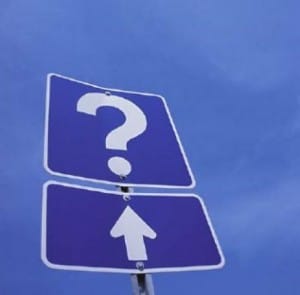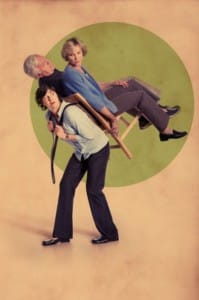
Even before the major personal health crisis that turned my life upside down, I had been experiencing minor crises in various areas. I always believed that a crisis was a kind of sign or reminder that I was doing something wrong or off track in the area where it occurred.
When I look at the situation today, I see that sometimes this was true, and many times it was not. Sometimes the aim of a crisis has not been to bring about change in the area where the crisis has manifested itself, but elsewhere. It is usually a change in general behaviour patterns, beliefs and attitudes.
In other words, the crisis may have occurred in the area where it had the biggest impact on me (read: threw me off track the most), but not necessarily in the area that needed to change.
For example, when I was in a serious car accident, it was not a sign that I should not get behind the wheel from then on… But it was certainly a warning, or it influenced the course of events. (Incidentally, many sages believe that the vehicle is symbolic of the path of life. All vehicle-related adventures are therefore supposed to foreshadow a major change or symbolically reflect our current life situation. For example, buying a new car is supposed to indicate a new path or a turning point.)
My recovery has taken me so far off the beaten track that I have had the time and opportunity to re-evaluate my general thinking and doing.
If a crisis were to arise in another area – business, for example – I would respond with even greater activity and enthusiasm. That is, it would not change me, but at most would reinforce my established beliefs and activities.
When she moved me to bed and separated me from my routine, I was forced to re-organise my schedule. And also my desires, values and goals.
Others also talk about the same experience. One of the most illustrative and profound stories is told by the top American expert on esotericism and Nobel Peace Prize nominee, Paul Solomon.
His special feature was that he could slip into a special state of half-sleep or prophetic trance. Then, without realising or remembering anything, he communicated with an intelligence – he called this entity simply Source – which gave surprisingly precise answers in various fields.
The child with brain damage who greeted his parents

Once upon a time, Paul was visited by a husband and wife who lived on the American West Coast and were part of the upper-class culture. Their lives revolved around worldly goods – prestige, money, parties …
They had a daughter who was born with a brain defect. She was four years old, but unable to speak or walk, and her parents were desperate. They told Paul that they had tried many approaches based on conventional and alternative medicine, but to no avail.
They confessed that the birth of their little girl literally turned their world upside down, as they could no longer live according to a regular schedule; they slowly disconnected from social events and turned to themselves and to the search for a deeper meaning of life. First they started looking for doctors, and later, when they couldn’t help them, for various healers.
At the same time, a new world began to reveal itself to them – one based on different, intrinsic values – that they had never known before.
When they asked Paul if there was anything he could do to help the girl, Paul went into a trance to find a solution. The answer he got was that the little girl had come into the world to say hello to her parents. This is part of a grand plan, which will literally force the parents to turn inwards.
If the process of spiritual rebirth had taken place naturally in my parents, I would have had to wait twenty or thirty years, because only then would I have been ready to accept my daughter’s advice. But they are lucky because the little girl has chosen the perfect body with which to carry out her mission immediately after birth.
The key question was: who was sick here … the parents or the little girl?
This reversal came as a real shock to the parents, who had seen themselves as living a perfect life and perceived their daughter’s health as far from perfect. They therefore felt that their daughter needed to be changed so that she would fit into their idea of life – which they would then continue to live in the old and established way.
The source gave the parents advice on how the little girl can be healed: do not see her as imperfect or sick, but rather see her as a beautiful being in all her greatness, beauty and wisdom. Love her as she is.
The parents decided to follow the advice and set about the task immediately and with dedication. On the same day, the girl spoke her first word and walked.
What happened? “The girl did her job and therefore no longer needed symptoms. When the parents changed their lifestyle, the girl got better,” Solomon explained.
A serious health condition as a cue for changes in other areas

This example is very illustrative of the need for – or rather, the role of – a personal crisis and of the wisdom of a universe where nothing happens by accident, by chance or by mistake.
But it also reveals something very important. When a crisis or unpleasant situation has “done its job”, it goes away. Without the need to analyse symptoms, find the “best solution”, research statistics, apply special techniques and so on.
If we can understand the background of why a situation has arisen, we will not avoid it, try to change it or turn a blind eye to it, but use it as a lever on the path to inner fulfilment.
Every unpleasant or unwanted situation is a new opportunity for growth … because everything that happens to us has only one goal: spiritual development.
Sometimes it is more or less clear what a situation is telling us. But often – as in the case of the wealthy couple and the sick little girl – we don’t.
However, we do not need to know the whole background or all the pieces of the jigsaw.
There is a simple formula to get to the key message. Every time something unwanted happens to us, we can ask ourselves where and what we are doing out of fear instead of love. (We use the term fear to describe anything that is not unconditional love. So anything that is not an expression of our true nature, which expresses itself in boundless trust and joy through our own creativity.)
Let us ask ourselves:
- Where do we want to change or adjust circumstances to suit us and lead to the desired outcome?
- In which areas and in which situations do we want to make a specific impression and show ourselves as different from who we really are?
- Who do we point the finger at and blame for our own failures?
- Where are we raping the situation and where are we holding back… instead of acting from the heart? (Or in other words – what are we forcing and what are we blocking in our lives?)
- In which areas have we come up with a series of justifications, excuses, “facts” and other beliefs to excuse our condition (which we don’t like) and so on? Where do we turn a blind eye and a deaf ear?
- In which situations do we resist change and cling to what we are used to and feel comfortable with?
- In what areas have we lost childlike inspiration, creativity, curiosity, faith in a better tomorrow and boundless trust in Life?
If we can answer these and similar questions honestly, we will not need a crisis to push us forward.
But how do we know which is the right answer? By feel. When the answer comes, we are overwhelmed by a wave of enthusiasm and feel a burst of joy, and we are on our way. We only need to persevere so much that the next moment, fears and worries – which are bound to arise – do not push us back to our current path.
If we have no idea how to move forward …

Well, sometimes we feel so entrenched in the existing reality that we don’t really see any potential. We may not be happy with the status quo, but we don’t find the inspiration or the strength to move forward. When we think of change, we have no idea what we could possibly do. Everything seems like a fog and the more we try to find something tangible, the more we are convinced that we cannot do anything.
Again, there is a very elegant solution. Let’s not look for new ideas and let’s not follow intuitive flashes of insight. Let’s tackle what we once knew and then put away.
Thomas Keller (Solomon’s disciple) offers two excellent questions to move us forward in these situations.
- What am I doing that I know I shouldn’t be doing?
- What am I not doing that I know would be good for me?
The answers will shake up the existing reality so much that we will be able to look at things a little differently.
The answer to the first question will almost certainly be found, because it is based on feelings of guilt, feelings of shame, fears and the like. For example, if we want to lose weight, we do not need to look for new miracle diets, patches, teas and the like, but just ask ourselves honestly what it is about what we do, how we think and how we eat that is not serving us on the road to a slimmer figure.
The answer to the second question offers us the potential for, or a substitute for , what we will abandon or change on the basis of the first answer. For example: the answer to the first question was that we eat too late at night, eat too much at once (too few meals) and are not physically active enough.
The answer to the second question offers us a solution to the new way of doing things.
Very simple.
Maybe too much … because we are running out of excuses.All we need is a decision.
P.S.: In fact, change is not always the solution. Sometimes the best we can do is to accept the situation unconditionally. However, if we have a choice between making a change in an important area or accepting the situation unconditionally, we can use the latter as a convenient excuse for sticking with the status quo. It is easiest to say that nothing can be done … so we will just accept the situation.
(Note: unconditional acceptance is not a passive state where we feel helpless and trapped by circumstances, but a state of trust and inspiration in which we feel very good. And one more thing. Let’s not rely on a feeling.
“I feel that this change is not good for me” is mostly just an excuse. The discomfort we feel is not an intuitive message or a “sign to stay the course”, but an internal resistance to change. We will make much better decisions if we act on logic, not emotion.)
So the overall formula would be: first, let us ask ourselves whether we are acting with maximum love or creative expression in this area. (We can also ask ourselves what we would recommend in response to a good friend if they were in a similar situation to us. The answer we would give him applies to us.)
Then let us work towards neither raping the situation nor blocking it, but doing the best we can according to the desired goal.
When we realise that we have done everything we can – and anything else would be either rape or blocking the situation – let’s just accept the situation and trust that everything is going in the right direction.
This article is based on the book “The Big Ugly Crisis”, by Boris Vene and Nikola Grubiša.
